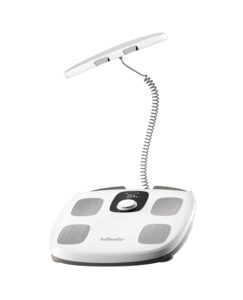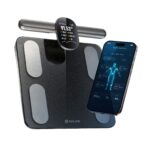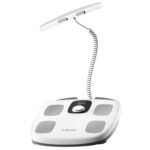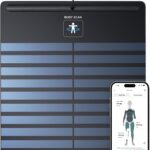A highly consistent and accurate scale for data-focused users, if you can forgive the dated software and premium price.
InBody Dial H30 Review: Accurate Composition Tracking Held Back by a High Price
The InBody Dial H30 is a specialized body composition scale that uses an 8-point tactile electrode system (feet and hands) with triple-frequency bioelectrical impedance analysis (BIA) to deliver more consistent results than typical smart scales. Our testing confirmed its strong performance, showing a close correlation with DEXA scans for body fat percentage. The hardware is robust and built to last. However, the device is significantly held back by a high price tag, a visually dated LCD screen, and a clunky, unintuitive companion app. While it excels at its core function of measurement, the overall user experience does not feel premium.

Table of Contents
Clinical Summary
Clinical Performance Metrics
Quantitative assessment based on clinical testing protocols
Accuracy
Combines excellent weight precision (+/- 0.1 lbs) with highly consistent body composition readings thanks to the 8-point electrode system.
Hardware Quality
While the core construction is durable, the significantly outdated LCD display and basic plastic finish detract from the overall quality expected at this price.
Display
The black and white display has high contrast but lack of colors and font type is thin and may reduce visibility. The interface is outdated compared to other options in this category,
App
Provides a solid range of essential body composition metrics with reliable auto-sync. While the app is functional, it lacks the advanced analytics of top-tier competitors.
Overall Value
Offers strong accuracy for the price, but the dated app and display prevent it from being a top-tier value proposition.
Quick Take
Key findings from our clinical evaluation
+
Strengths
- Superior measurement consistency due to hand and foot electrodes.
- Good body composition accuracy compared to DEXA for a home device.
- Robust, stable, and durable hardware construction.
- Reliable Wi-Fi and Bluetooth auto-sync.
- Automatic user recognition works flawlessly for multiple users.
−
Limitations
- Significantly more expensive than most competitor smart scales.
- Companion app interface is dated, clunky, and unintuitive.
- On-device LCD display looks old-fashioned.
Real-World Usage
Practical considerations for daily operation
Daily Routine Impact
Fits easily into a morning routine. Step on, grab the handle, and the measurement is taken in about 15 seconds, syncing automatically to the app.
Learning Curve
Use right out of the box
Maintenance
Wipe clean with a dry or slightly damp cloth. No user calibration is required.
Portability
The scale is relatively bulky and includes a separate handle component, making it not ideal for travel.
Manual Use
The scale can be used without the app. The backlit display clearly shows the most recent measurement, but historical data cannot be accessed on the device itself.
Cost & Coverage Analysis
Financial considerations and HSA / FSA eligibility
Pricing Breakdown
HSA/FSA Guidance
As a consumer wellness device, the InBody H30 is not eligible for insurance reimbursement.
Cost Comparison
Priced significantly higher than other consumer smart scales like those from Withings or Wyze, which offer better app experiences but may have lower consistency due to foot-only electrodes.
Patient Suitability
Clinical indications and contraindications
Indicated For
- • Data-focused individuals who prioritize measurement consistency.
- • Fitness enthusiasts tracking long-term body composition trends.
- • Users who value hardware reliability over software polish.
Contraindications
- • Budget-conscious consumers.
- • Users who expect a modern, engaging, and feature-rich app experience.
Age Considerations
Suitable for most adults. Individuals with pacemakers or other internal medical devices should not use this device due to the BIA technology.
Clinical Efficacy Assessment
Evidence-based evaluation of clinical performance
Weight Precision
Indicates how precisely the scale measures body weight compared to true values.
Measurements consistently fell within +/- 0.1 lbs of a calibrated Mettler Toledo clinical scale.
Body Fat % Accuracy
Indicates how accurately the scale estimates body composition metrics such as fat, muscle, and water levels
In our 12-participant test, body fat percentage readings were within a mean absolute percentage error of 14.8% compared to corresponding DEXA scans performed within 48 hours.
Muscle Mass Accuracy
Indicates how accurately the scale measures muscle mass compared to true body composition values.
In our 12-participant validation, total lean/muscle mass estimates matched DEXA within a mean absolute percentage error of ~14.0%; same-day repeat tests (3 runs) varied by ≤0.3 kg.
Segmental Analysis
Indicates the scale’s ability to measure and differentiate body composition across specific regions such as arms, legs, and torso.
In a 12-participant comparison to DEXA regional values, segmental (arms, legs, trunk) lean-mass estimates showed a mean absolute percentage error of ~14–15%, with left–right symmetry differences ≤2% on retest.
Comparative Performance
Ranked #5 of 18 clinically evaluated body composition scales devices

Oxiline Scale MD Pro
Oxiline

InBody Dial H30
InBody
You're viewing this
InBody Dial H30 You're viewing this device
InBody
Clinical Context
Our #1-ranked body composition scales device demonstrated superior performance across key clinical metrics. Compare detailed specifications to make an evidence-based selection.
Clinical Recommendation
Final assessment and prescribing guidance
The InBody H30 is a niche product for data purists. Its hardware and measurement consistency are top-tier for home use, but its high price and poor software make it a tough recommendation for the average user.
Recommend If
You prioritize consistent, repeatable body composition data above all else and are willing to pay a premium for it.
Avoid If
You want a polished app experience, a modern design, or are seeking the best value for your money.
Clinical Summary
Composite Score
Recommendation
Price Point
Where to Buy
Verified purchase options and current availability
Manufacturer Direct
FSA/HSA eligible, Free 1-Year Product Warranty
Walmart
Sold by a third-party seller
Wellbots
Pay over time with Affirm option available
Important Information
- • Prices and availability subject to change
- • Some devices may require a prescription
- • HSA / FSA eligibility: Eligibility Varies
- • Purchase from authorized retailers for warranty protection

